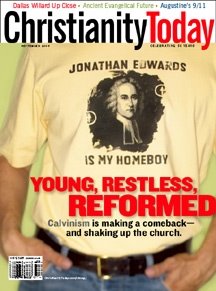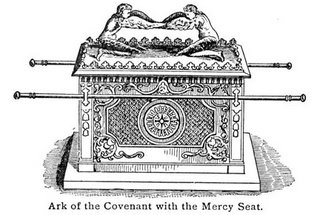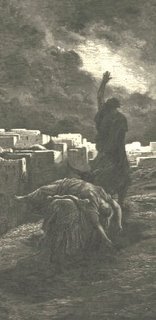Well, so I lied a little... I really did plan to get this post up last night, but just didn't. I have an excuse, but it's not a good one.
So, here we go with the continuation... Let's tackle together
Deuteronomy 22:22-30 together. One starting note: I'll be using the
New American Standard Bible (NASB) today as the primary translation to defend this passage. The NASB is
generally recognized to be the most literally accurate translation of the original Biblical texts. This means that while you get almost
exactly the words of the author, you tend to sacrifice a little bit of readability.

However, given the challenges in this passage the NASB is the right place to go. Before we begin, here's another reminder that the post is a little 'PG', so click elsewhere if'n you want...
The Original Passage (in a Modern Translation)
If a man is found lying with a married woman, then both of them shall die, the man who lay with the woman, and the woman; thus you shall purge the evil from Israel.
If there is a girl who is a virgin engaged to a man, and {another} man finds her in the city and lies with her, then you shall bring them both out to the gate of that city and you shall stone them to death; the girl, because she did not cry out in the city, and the man, because he has violated his neighbor's wife. Thus you shall purge the evil from among you.
But if in the field the man finds the girl who is engaged, and the man forces her and lies with her, then only the man who lies with her shall die. But you shall do nothing to the girl; there is no sin in the girl worthy of death, for just as a man rises against his neighbor and murders him, so is this case. When he found her in the field, the engaged girl cried out, but there was no one to save her.
If a man finds a girl who is a virgin, who is not engaged, and seizes her and lies with her and they are discovered, then the man who lay with her shall give to the girl's father fifty {shekels} of silver, and she shall become his wife because he has violated her; he cannot divorce her all his days.
A man shall not take his father's wife so that he will not uncover his father's skirt.
In Plain English
If you catch a couple engaging in adultery, they have done an evil thing and should be put to death. This is true even if the girl is not actually married yet, only engaged. If it is possible that the girl is a victim of rape, only the man will be killed.
If a man sleeps with a unengaged virgin, he must marry her and cannot divorce her.
Oh, and don't sleep with your stepmother.
Objections
This is, in reality, a much more straightforward passage. That doesn't mean that you get a shorter post, however. Just think of the bargain you're getting!
What's the big deal with a little action on the side? Why is adultery a capital offense?
As we
discussed previously, God instituted marriage so it is sacred... He created men and women to be together, one-to-one, for a lifetime. That relationship is intended to be reflective of the unity within the Godhead itself - existing as
One in three persons. This gives marriage, and the intimacy
found in sex, the highest meaning.
When we violate that union, we are thumbing our nose at God's rule over our bodies and in some way belie His nature. Our infidelity and fornication muddies the representation marriage should give of God's holiness and unity.
Let me give another example just to clarify: There are a couple studies (
here is one) that show the extreme influence a dad has over whether or not his children continue in their faith. Why do you think there is such an imbalance in the figures? I'd assert that, at least in part, it is because God has identified Himself as our Heavenly Father and our
earthly role reflects on him.
So, when we dads lack faith or
abuse the authority given to us it has a profound effect. Not only is there an immediate impact, but there is also one that plays out later by continuing to skew the child's perception of who "God, Our Father" must be.
As fatherhood represents God's relationship towards/to us, so pure marriages represent God's loving provision for us and His own triune nature. (And we'll set aside, for now, the deeper meanings given to marriage in light of the New Testament and Christ!)
FOUL! In one case we have an engaged woman 'in the city' engaging in adultery who gets stoned... What if she was being raped? So what if 'no one could hear her cries'!First point: It's important to note, again, that God treats the engagement as effectively equal to being married.
I think it's fair to say the real issue here, as the skeptic points out, is proving consent to sex. If a woman is raped, she has committed no wrong.
Verses 26-27 make this specific point: No one chooses to be murdered and the victim is guilty of no crime.
The problem was, and still is today, is how to prove allegations of rape. With the absence of clear evidence, almost all rape cases devolve into a "He said, she said" kinda argument where persuasion is often more valuable than truth. God is giving His people a framework full of discernment for trying to assess 'what really is going on'.
In one case, a woman and man are found having illicit relations in the city. The relationship is judged to be consensual (and thus adulterous) because there no cries for help heard. Now before you get your
hair up in a bun over this, just think for a second... In order for the couple's relationship to have been discovered in the first place, someone must've seen or heard something.

The law implies some level of 'eyewitness testimony'. Assuming that person has enough evidence to make such a serious allegation, we can assume that they also had opportunity to discern something about the circumstances of the crime. Remember that cities and houses back then were not like they are today: people knew each other, who belonged, who didn't, and probably could hear more than they wanted of their neighbors to thanks to the rather meager home materials.
In the city, with people all around, it is at least reasonable to assume that a woman being raped would struggle, cry for help, or something and be helped. If it happened in the middle of nowhere (that is, a 'field'), she may not do so since no one's likely to come to her aid anyway. So, where
sufficient doubt arises, the woman's life was to be
spared while the man faced the full penalty of the law.
Again, Calvin tackles this well in his commentary:
But since one who has been ravished is not criminal, a woman is absolved if she be forced in a field, because it is probable that she yielded unwillingly, inasmuch as she was far from assistance. Although, however, the terms are accommodated to the comprehension of a rude people, it was the intention of God to distinguish force from consent. Thus if a girl had been forced in a retired part of a building, from whence her cries could not be heard, God would undoubtedly have her acquitted, provided she could prove her innocence by satisfactory testimony and conjecture. (Volume 3, emphasis mine)
Well, keep reading... According to the Bible, a woman who is raped has to marry her attacker and she's stuck with him.The objector is referring to
verses 28-29 which read as follows in the
King James Version:
"If a man find a damsel that is a virgin, which is not betrothed, and lay hold on her, and lie with her, and they be found; Then the man that lay with her shall give unto the damsel's father fifty shekels of silver, and she shall be his wife; because he hath humbled her, he may not put her away all his days."The objector is assuming that this passage cites another instance of rape. Usually they will defend this by pointing out that
previous verses almost certainly discuss rape and that in this verse the man 'lays hold on' (or "seizes" in the NASB) the woman.
While the previous two verses do discuss rape, they are also dealing with the overarching issue of adultery. Discussing rape becomes necessary in order to discern whether or not the woman is
a victim or an adulteress. Much like our legal code, each of these verses is an individual statute of the law... Some are linked (like
23-27 are thanks to the 'But' in v25) but others stand alone. I think this verse is simply a loner given that we've gone from talking about married or betrothed women to an
unmarried/unbetrothed damsel here.
The second assumption - that "and seizes her" indicates that the woman is forced into the act - is difficult to prove or deny. Let's look at the parallel texts in the previous passages using the NASB:
v22 - "found lying" [No inference of force]v23 - "and lie with her" [No inference of force]v25 - "force her, and lie with her" [Obvious force, two clauses]
v28 - "seizes her, and lie with her" [Force? Two clauses]
In all these verses, the same Hebrew word (shakab) is translated as 'lie'. It occurs 14 times in the book of Deuteronomy and refers either to 'laying down' for rest or for sexual relations ('laying with someone').
There are two different words being used for"force her" and "seizes her":
"Forces" (v25) - The Hebrew word here is 'chazaq' which most often is dealing with strength or prevailing against/over another. Thus, a very literal translation of v25 might be "... he prevails against her and lies with her". In this case, the woman is clearly being taken against her will."Seizes" (v28) - A different word is used here - 'taphas', which is literally means to 'catch or lay hold of'.It's difficult to tell whether or not 'taphas' should be understood in verse 28 to be indicating rape or not. God chose to clearly use the word "forces" (
chazaq) in the previous verse and could've chosen to do so again. But He didn't, so what are we to make of it?
I believe that the bottom line is that the fact of rape is functionally irrelevant in those verses (28-29). Allow me to give two reasons why I can make that bold statement:
1) Let's assume that the maiden in verse 26 has been raped. If her attacker is put to death, what is the outcome for the young woman?

As
we noted before, a woman whose sexual purity is compromised would have a difficult time finding another husband. As an aside: Before we go indicting the Hebrew culture here, let's own up to the fact that female victims of rape face similar stigmas even in our modern culture. Many women who tell a boyfriend about a previous rape suddenly find the relationship 'cooling'. I'm not saying it's right, I'm just saying that we're not so different from the Israelites after all.
Given that the woman in our Biblical example would've likely been 'husbandless', God makes a similar provision
for her care. It doesn't say she must grow to love her attacker... It
does force the attacker to care for and provide for the woman who he victimized for the rest of his life.
2) If the passage does not refer to an incident of rape, we're still dealing with a loving provision. The woman's purity, and thus her cultural status, has been damaged and she must be protected. As a result, the marriage is still mandated for her good and other young men would learn one the merits of
waiting.
So, rape or no rape, the law here is setting a high premium on the care of the victimized woman. I'm
not saying the particulars don't matter! I'm just trying to get you to see that the legal demands on the offender are being tempered with provision for the offended.
What's all this stuff about uncovering "your father's skirt" stuff in verse 30?Simple...
Don't have sex with your stepmother. Incest is dealt with elsewhere and here the man is making it with "his father's wife" (not "his mother"). The skirt business is to imply that the abomination of such a relationship stains the perpetrator
and dishonors his father (with overtones of 'the two shall become one flesh').
So, what does this say to us today?
All the same stuff I mentioned in my last post holds true again... So, rather than restate that, let me make two new points.
 1) The danger of literal legalism
1) The danger of literal legalism: When we read a legal document, some of our American minds start looking for loopholes. If our lease is clear about having 'no pets', we try to figure out if the language will allow us to keep
Snoogums the Chihuahua under the guise of 'alarm system' or 'biological experiment control'. We've become a society that really does need to define what 'is' actually is.
The Israelites of the Bible were the same way. They became so mired in the details of the law that it really is absurd. For example, passages of the
Talmud relating to these verses spend pages and pages defining, in absurd detail, the definition of a "field".
As a result, we let the letter of the law trump the spirit of the law. In looking at these passages, we make a big deal out of fields and cities, when the underlying fact is that the issue is burden of proof. Likewise, by seeking obedience to the letter of the law we miss the whole point about personal holiness being more than just our actions... The Pharisees made this mistake and were
sharply rebuked by Christ for it.
Though I hope few of us have ever considered acts of adultery or rape, the point is that we are condemned by the law for even
considering such sins. When we lust, we condemn ourselves and our sin carries a death penalty. For the skeptic, there's a huge downside if God is real.
The good news is that we can be forgiven for our transgressions against the law by putting our faith in Christ. The Bible tells us that "for our sake he made [Christ] to be sin who knew no sin, so that in him we might become the righteousness of God" (
1 Cor 5:21). Christ took the penalty for our shortcomings (actions, inaction, and thought)!
2) The danger of tolerating sin: Look at these verse snippets from the whole section:
- v21:
"...you shall purge the evil from among you."- v22:
"...thus you shall purge the evil from Israel."- v24:
"Thus you shall purge the evil from among you."This is really the key takeaway from Deuteronomy 22. Israel was a nation that existed in covenant relationship with God and was expected to keep themselves pure and undefiled. In the same way, God 's relationship with us and the church today is one of continuing refinement (sanctification). While I'm absolutely
not advocating stoning people for offenses, I
am saying that we need to be 'ruthless' in addressing sin in our personal lives and in the church.
 Church discipline
Church discipline is out of fashion nowadays... We've replaced it with "a spirit of tolerance". And while I think we need to exhibit a certain amount of grace, I think Paul's exhortation to us in 1 Corinthians sets a different bar than we like:
Your boasting is not good. Do you not know that a little leaven leavens the whole lump? Cleanse out the old leaven that you may be a new lump, as you really are unleavened. For Christ, our Passover lamb, has been sacrificed. Let us therefore celebrate the festival, not with the old leaven, the leaven of malice and evil, but with the unleavened bread of sincerity and truth.
I wrote to you in my letter not to associate with sexually immoral people— not at all meaning the sexually immoral of this world, or the greedy and swindlers, or idolaters, since then you would need to go out of the world. But now I am writing to you not to associate with anyone who bears the name of brother if he is guilty of sexual immorality or greed, or is an idolater, reviler, drunkard, or swindler—not even to eat with such a one. ... God judges those outside. "Purge the evil person from among you." (1 Cor 5:6-13)
Paul is pointing out that the tolerance of a little sin (leaven) eventually permeates the whole church (lump of dough). As we let sin take root in our midst, we'll find it to be a lot like cancer - eventually killing the body that it infects.
We are called to holiness... And while that goal is too lofty for us in our flesh alone, we must pursue it in Christ by God's grace. When we see sin, it should be confronted and dealt with, particularly within the context of the local church.
Grace must temper all this (for we all have planks in our own eyes) but we mustn't compromise on righteousness.
Onto Judges next!
Labels: Bible
 Between recovering from the road trip, attending training, and assorted other fatiguing things, I wasn't able to get to the WWWednesday post on time. The fam is going camping this weekend, so I won't be posting anything else until early next week. So, I wanted to get this post up to bridge the gap.
Between recovering from the road trip, attending training, and assorted other fatiguing things, I wasn't able to get to the WWWednesday post on time. The fam is going camping this weekend, so I won't be posting anything else until early next week. So, I wanted to get this post up to bridge the gap. 3) Speaking of regularly-linked blogs, check out the continuing sports metaphor over on Challies blog. I bet he's not the first person to think of Fantasy Preaching, but he's clearly put the most time into it. In analyzing his method, I think the stats make Mark Driscoll the Marshall Faulk of the game. I must admit to spending a little time during a break in my class working on an optimal draft strategy.
3) Speaking of regularly-linked blogs, check out the continuing sports metaphor over on Challies blog. I bet he's not the first person to think of Fantasy Preaching, but he's clearly put the most time into it. In analyzing his method, I think the stats make Mark Driscoll the Marshall Faulk of the game. I must admit to spending a little time during a break in my class working on an optimal draft strategy.






























